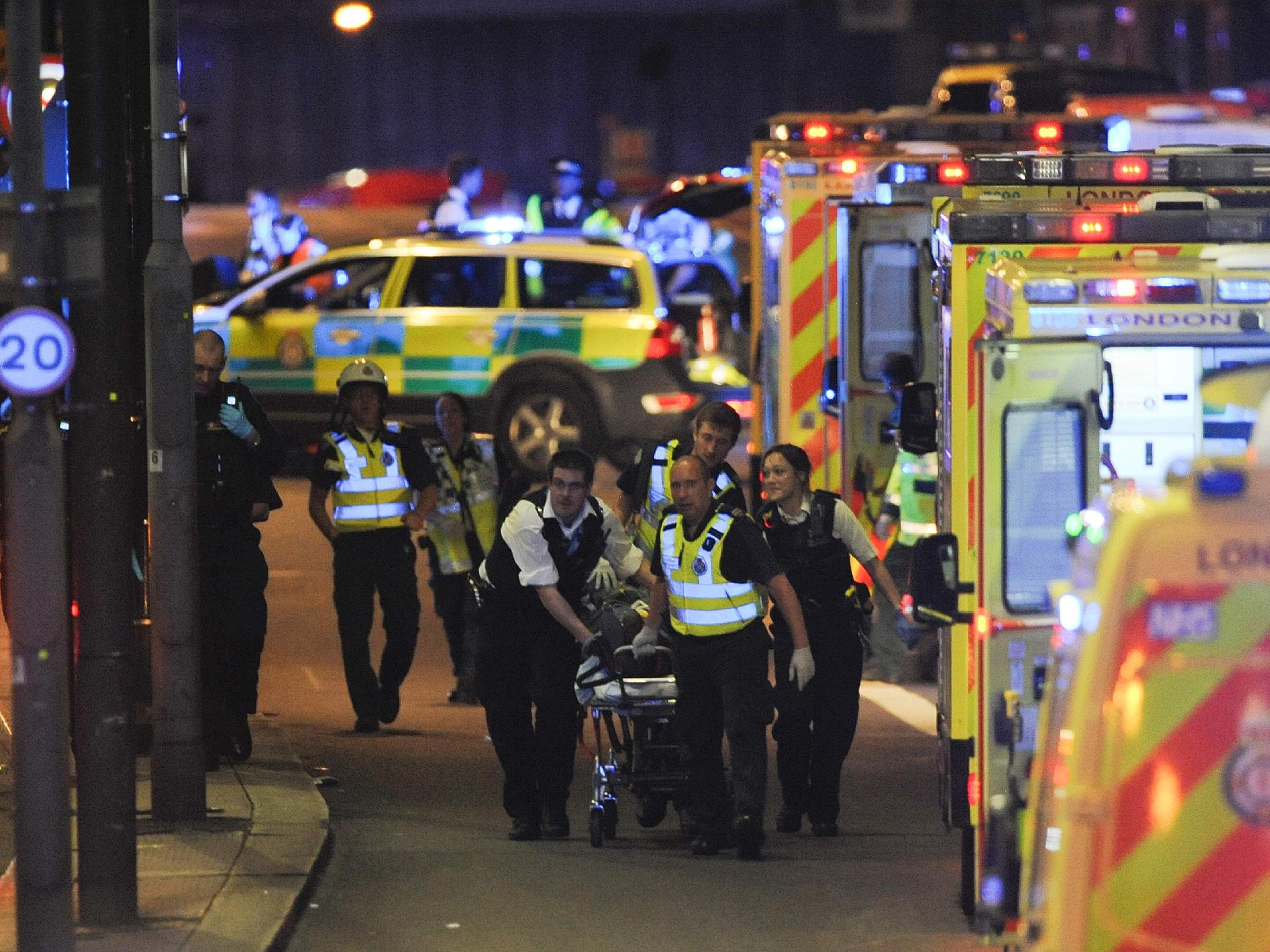London Bridge attackers may have taken steroids before Isis-inspired rampage, court hears
Inquests into terrorists’ deaths will examine potential effects of DHEA

The three terrorists who carried out the London Bridge attack might have taken steroids before launching the atrocity, a court has heard.
Isis supporters Khuram Butt, 27, Rachid Redouane, 30, and Youssef Zaghba, 22, had high levels of DHEA in their bodies, suggesting the steroid may have been consumed hours or days before the atrocity.
The Westminster attacker Khalid Masood had also taken steroids before carrying out his Isis-inspired rampage in March, another hearing was told last month.
The implications of the findings for the London Bridge attackers will be analysed by experts and considered at an inquest into their deaths, the Old Bailey heard.
Judge Mark Lucraft QC, the Chief Coroner of England and Wales, said those inquests will be held separately to those for their eight victims in early 2019.
Speaking at a pre-inquest hearing, he expressed hope that it would provide grieving families with answers and give “comfort in such difficult circumstances”.
Jonathan Hough QC, counsel to the coroner, said the process was of great public importance and would be “full, rigorous and fair”.
Canadian Christine Archibald, 30, and 45-year-old Frenchman Xavier Thomas were the first victims of the attack on 3 June. They were run over and killed as the terrorists ploughed a hired van into pedestrians on London Bridge.
The vehicle crashed into railings outside the Barrowboy and Banker pub and the trio emerged armed with large knives and fake explosive vests, immediately attacking passers-by.
Butt, Redouane and Zaghba entered pubs and restaurants as they made their way towards Borough Market, fatally stabbing Alexandre Pigeard, 26, as well as Sara Zelenak, 21, Kirsty Boden, 28, Sebastien Belanger, 36, James McMullan, 32, and Ignacio Echeverria Miralles de Imperial, 39.
Some witnesses said they believed the attackers were on drugs during the rampage, reporting hearing them shout “Islam, Islam” and “this is for Allah”.
Two unarmed police officers were severely injured while trying to fight the men, while members of the public hit them with chairs, glasses, bottles and even bread crates to try to let others escape.
As another man was being stabbed outside The Wheatsheaf pub, armed police arrived on the scene and shot the three terrorists dead in a hail of at least 50 bullets as they charged at them. The attack started at 10.07pm and ended nine minutes later.
The hearing was told that the inquests into Butt, Redouane and Zaghba’s deaths must be held with a jury because they were caused by police, even though there is no suggestion of wrongdoing.
A report submitted to the inquest said police were concerned that the fake explosive vests worn by the attackers were real and that they could blow themselves up to cause further casualties, as seen in Isis’s Paris attacks.
Lawyer Victoria Ailes, representing five of the victims’ families, said they were particularly concerned to find out about any CCTV footage or mobile phone film showing the attacks on their loved ones.
Videos taken by members of the public will be considered alongside police body-worn camera footage and other evidence, including forensic material from the knives and van used.
Almost 1,800 statements have been taken from witnesses to the attack, which came as the area around Borough Market was filled with Londoners and tourists enjoying a warm Saturday night.
London Bridge Terror Attack
Show all 16The inquests will hear evidence from police, the ambulance service, intelligence agencies and the families of both victims and attackers.
More than a dozen people were arrested and interviewed by police in the wake of the atrocity but no one has been charged with an offence.
The coroner will examine the background of each attacker, their radicalisation and preparations, and what MI5 knew before the atrocity.
A report released in December by David Anderson QC, the former Independent Reviewer of Terrorism Legislation, found that security services failed to prevent the attack despite having Butt under surveillance for almost two years.
The ringleader was a known associate of Islamist preacher Anjem Choudary and was the subject of a dedicated MI5 investigation for suspected attack planning from mid-2015 onwards.
But police and the Crown Prosecution Service decided not to launch a separate investigation after he was filmed praying to an Isis flag during a television documentary on a prolific group of Islamists, and believed his focus was moving away from terror attacks to travelling abroad.
An extensive intelligence operation had not flagged Moroccan-Italian Zaghba and Moroccan Redouane as threats and “much remains unknown, even today, about the mindset of the three conspirators and the planning of the attack”, the report concluded.
It revealed that Zaghba was put on a Europe-wide warning list after telling officials at Bologna airport he was travelling to Turkey to be a “terrorist”, but British authorities took no action.
Months later, Italy asked MI5 for information on Zaghba but it did not respond, possibly because the request “arrived in the incorrect mailbox” and was not chased up.
“With Butt what you had was a man who was under active investigation from MI5, who did probably around the end of 2016 team up with his two co-conspirators, and yet MI5 and the police between them were not able to identify what they were actually planning,” Mr Anderson said.
Additional reporting by PA
Subscribe to Independent Premium to bookmark this article
Want to bookmark your favourite articles and stories to read or reference later? Start your Independent Premium subscription today.
